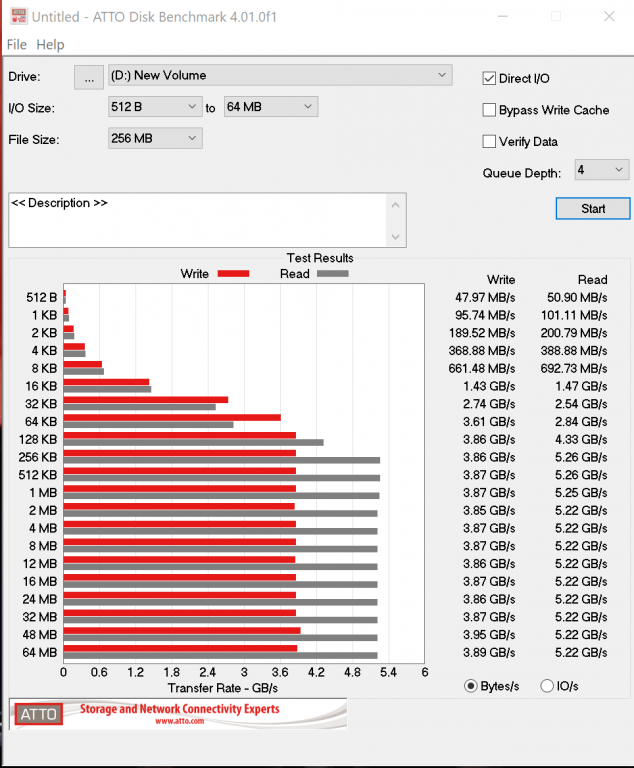ATTO Disk Benchmark is perhaps one of the oldest benchmarks going and is definitely the main staple for manufacturer performance specifications. ATTO uses RAW or compressible data and, for our benchmarks, we use a set length of 256mb and test both the read and write performance of various transfer sizes ranging from 512b to 65mb. Manufacturers prefer this method of testing as it deals with raw (compressible) data rather than random (includes incompressible data) which, although more realistic, results in lower performance results.
Initial ATTO results are a bit lower than expected as listed specs are 4.9GB/s read and 4.2GB/s write. There is a healthy progression in performance pictured which leads us to believe that this is a very well put together SSD.
CRYSTAL DISK BENCHMARK VER. 0.0 X64
Crystal Disk Benchmark is used to measure read and write performance through sampling of random data which is, for the most part, incompressible. Performance is virtually identical, regardless of data sample so we have included only that using random data samples.
THROUGHPUT
IOPS
Very strong performance is shown in both the throughput and IOPS results of the newest version of Crystal Diskmark 7 and all results are above listed specification. Gotta love those random 4K IOPS above 700k read and write though…
The toughest benchmark available for solid state drives is AS SSD as it relies solely on incompressible data samples when testing performance. For the most part, AS SSD tests can be considered the ‘worst case scenario’ in obtaining data transfer speeds and many enthusiasts like AS SSD for their needs. Transfer speeds are displayed on the left with IOPS results on the right.The AS SSD results aren’t as appealing as we might like to see but do get a first look at read and write IOPS which appear to be in the general ball park of listed specs.
AS SSD is pretty much a mixed bag with throughput result similar to ATTO, all the while also hitting 7GB/s write IOPS. We can guess that the benchmark software we are used to might not be completely in tune with the newest Gen 4.
 The SSD Review The Worlds Dedicated SSD Education and Review Resource |
The SSD Review The Worlds Dedicated SSD Education and Review Resource | 


Was the testing done in the CPU native NVMe port or the PCH connected NVMe port?
Kudos… I slipped. Thank you. Will be reposting benchmarks before night end. All but one displayed improvement.
Really what a nice product combination of all aspects required for a small technical component are featured in it in a well defined manner hats off for it.
Review of these devices help to mention their capacity and power to use all the various set of features are discussed and covered under it.
I t will be nice when there are more MPCIe 4.0 (Gen 4) NVMe SSD controllers other than the Phison with its PSE5016-E16. I have a feeling there is much more potential with the Gen 4 SSDs that we will see, hopefully in the very dear future, as everyone should already have their controllers out and being used, as they’ve had more than enough time for product development.
In any case, I’m anxiously awaiting many more reviews of Gen 4 SSDs.
Thanks, Les
I want to use this drive as a Windows boot drive but ALSO run a couple virtual machines on the same drive. Will WIndows performance suffer while the VMs are running?
Can I use this drive in a PCIe Gen3 mobo?
As a PCIe 4.0 SSD, the MP600 delivers incredible storage performance, and is fully backwards compatible with current PCIe 3.0 platforms. It is equipped with a high surface area aluminum heatsink, helping to maintain its performance even under heavy load.